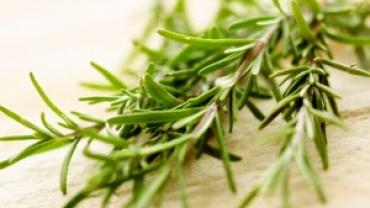
Ah rosemary"¦that distinctively aromatic woody herb. Its pungent flavor seems to go a long way in flavoring many a recipe but along with its touted fragrance and taste comes a propensity to support health.
Rosemary is an antioxidant and anti-inflammatory superstar hiding in a savory herb. 90% of the antioxidant capacity of rosemary is due to carnosol one of the plant's polyphenol constituents but other compounds in the herb namely carnosic acid and rosmarinic acid have also shown antioxidant capacity. In animal models these compounds have been shown to protect against hydrogen peroxide and iron sulfate-induced oxidative damage. One study even showed them to be more effective free radical scavengers than vitamins C and E two well-known antioxidants. The same study showed these rosemary extracts to be effective in reducing mRNA transcription of inducible nitric oxide synthase (iNOS). In moderate amounts nitric oxide is a helpful vasodilator but very high levels can lead to the formation of reactive nitrogen species such as peroxynitrite which can increase oxidative burden at the cellular level leading to lipid peroxidation and degradation of proteins and DNA.
In rat models of chemically induced liver damage rosemary extracts were shown to be hepato- and nephroprotective. Compared to controls rats treated with rosemary extracts had reduced levels of ALT and AST two strong markers for liver damage as well as lowered urea and creatinine indicating that rosemary was also helpful for protecting kidney function. The study authors found 18-cineole (eucalyptol) to be the most active constituent in this action.
Research shows that rosemary may be a helpful adjunct in inflammatory conditions associated with insulin resistance. A study of cultured adipose cells showed that carnosic acid extracted from rosemary led to reduced levels of the inflammatory markers TNF-α and NF-κB and also reversed TNF-α-mediated suppression of insulin-stimulated glucose uptake. Adipose tissue is itself an endocrine organ which generates inflammatory compounds and signaling molecules that may cause or exacerbate insulin resistance leading to a vicious cycle of yet more body fat accumulation.
Rosemary extracts have also shown promise in the area of skin health. One study demonstrated that rosemary reduces the inflammation associated with acne and skin lesions. The three most active rosemary compounds (carnosol carnosic acid and rosmarinic acid) exerted both overlapping and unique immune-modulating activities in vitro. Rosmarinic acid suppressed production of IL-8 while the other two compounds inhibited IL-1β production. The varied effects of the individual components suggests that rosemary might best be taken as a whole food or in an extract form that preserves multiple active compounds. Another study that employed human dermal fibroblasts and epidermal keratinocytes in vitro showed that carnosic acid helps protect skin cells from photo-aging induced by ultraviolet radiation. In addition to its scavenging of free radicals in the skin rosemary extract also exhibited an ability to down-regulate the matrix metalloproteinases implicated in the breakdown of extracellular matrices that lead to the aged appearance of the skin.
Another promising area for rosemary extract is women's health. The anti-inflammatory properties of this herb suggest it could be a helpful adjunct against the cramps and pain associated with the menstrual cycle. But rosemary's potential doesn't stop there. A study looking at human ovarian cancer cells in vitro determined that rosemary extract was effective in inducing apoptosis and inhibiting proliferation of certain forms of this disease by affecting multiple steps of the cell cycle and modifying the expression of several genes involved in apoptosis. This study used rosemary extract in conjunction with the common chemotherapy drug cisplatin and found the combination to be synergistic. Another study involving estrogen receptor-negative human breast cancer cells in vitro showed rosemary extract to induce cell cycle arrest and induce expression of antioxidant and apoptosis genes. Interestingly these effects were magnified in combination with curcumin.
Rosemary provides a vast array of impressive health benefits and is available in high-quality concentrated extract form. Of course there's no harm in getting some the old fashioned way -as a delicious addition to dinner.